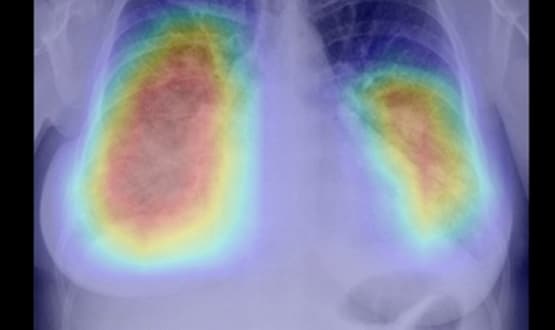NHS team reports potential for AI in rapid detection of lung cancer
- 26 February 2020

An algorithm developed by a UK tech start-up has been found to be capable of competently identifying lung cancers by a team at University Hospitals of Leicester NHS Trust.
The Red Dot algorithm, developed by artificial intelligence (AI) software company behold.ai, was fed a sample of chest X-rays from 1,513 patients who had been directly referred by a GP over a two-week period in June and July 2019.
The algorithm correctly identified the presence and location of 10 out of 11 incidences where cancers were later histologically confirmed through tissue samples tested in a lab..
While 1,513 examinations were analysed using the algorithm, the team was specifically interested in cases that were referred by a radiologist or reporting radiographer for a CT scan directly after an X-ray, to confirm or rule out the presence of cancer.
The radiology team suspected the disease in 39 out of the 1,513 X-rays and referred those 39 patients for a CT scan.
Dr Indrajeet Das, a consultant radiologist at University Hospitals of Leicester NHS Trust who worked on the project, said: “The AI project is in its early days, but the initial outcomes are very promising. The next steps would be to run clinical trials to create a sound evidence base to demonstrate that it is both safe and beneficial in clinical practice.”
The Red Dot algorithm works by delivering an ‘instant triage’ of each X-ray in just a few seconds.
According to the latest Radiology Review by the Care Quality Commission, the increasing rates of chest X-rays and scans has resulted in some NHS hospitals recording backlogs in reporting the results.
An algorithm capable of identifying abnormalities quickly and accurately could therefore enable medical staff to prioritise the most urgent cases first.
Dr Thomas Naunton-Morgan, behold.ai’s Medical Director, said: “Radiologists, like those in the team we worked with in Leicester are keen to report the abnormal scans first, shortening the turnaround time for the patients that need the most urgent care.
“The potential for our algorithm to support this care pathway is a very exciting prospect.”
The case for applying artificial intelligence to disease screening continues to gain traction amid growing evidence for the technology’s potential.
Findings published by Google DeepMind in January suggested that its algorithm could identify breast cancer with greater accuracy, fewer false positives and fewer false negatives than a human clinician.
The UK government recently set aside a £140m award to help accelerate the adoption of AI-based technologies in the NHS, as part of the forthcoming, £250m artificial intelligence “lab”.





1 Comments
I think they have acted unethically by copyrighting/trademarking the name “red dot”, given that this term has been used in Radiology /radiography circles as a general term for many years.
I believe they have appropriated it even for educational courses on the subject!
So if an NHS Trust ran such training, they could be stung for royalty payments.
Comments are closed.